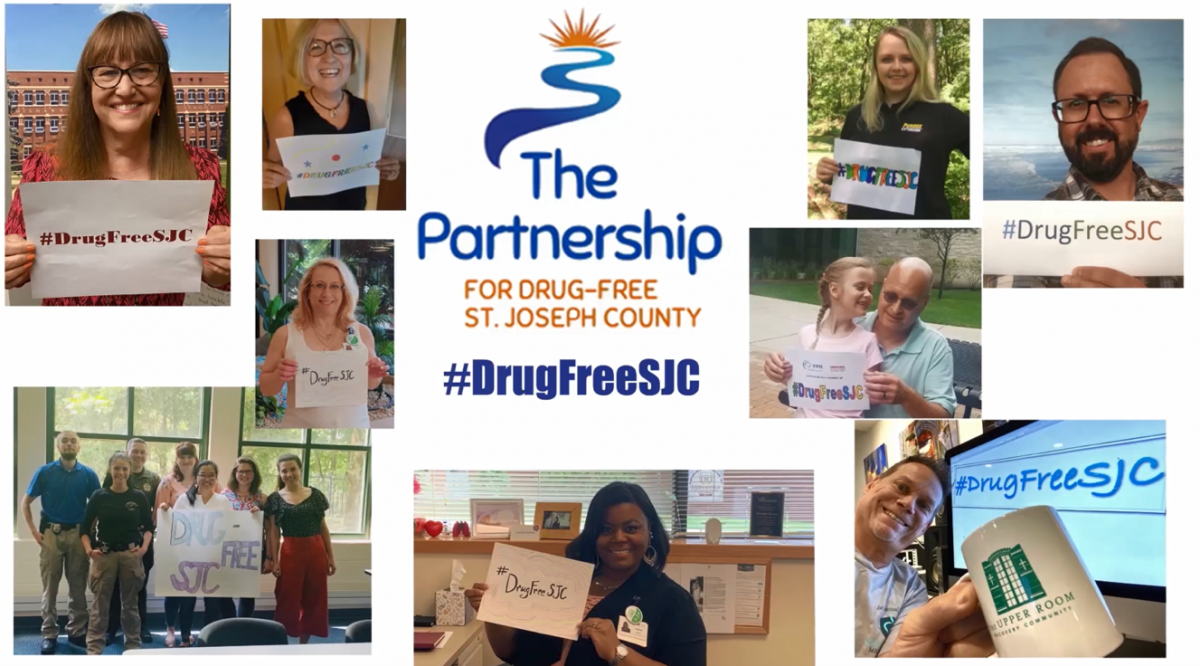
“The Partnership for Drug-Free St. Joseph County’s service area covers the 461 sq. miles of St. Joseph County, Indiana,” said the coalition’s DFC Grant Coordinator Janet Whitfield-Hyduk. “Located along the Indiana-Michigan border, the county is adjacent to the high intensity drug trafficking area linking Chicago and Detroit. The Indiana toll road running through the northern county is considered a major drug trafficking corridor.”
“Nearly half of the county’s residents live in the ethnically diverse, urban cities of South Bend and Mishawaka,” said Whitfield-Hyduk. “The city of South Bend is the fourth largest city in Indiana, where 38% of state residents live. The area is served by six public school corporations with an enrollment of almost 40,000 students. Nearly half of these students attend the South Bend Community Schools, where 71% of students receive free or reduced lunch and 67% identify as members of racial or ethnic minority groups.”
“The coalition formed in 1990 with a grass roots group of concerned citizens under the Governor’s Commission for Drug-Free Indiana,” said Whitfield-Hyduk. “Through the years, our coalition’s name has changed and we have merged with other groups with the same mission and goals to become the Partnership for Drug-Free St. Joseph County. In October 2018, the coalition was awarded the Drug-Free Communities Support Grant.”
“Participation in our virtual meetings during COVID-19 is not as high as it usually is with in-person meetings,” said Whitfield-Hyduk. “We realize that it is partly due to not everyone having Zoom or being comfortable using it. Most of our members would rather be able to meet in person. We also haven’t been able to host the events that would have normally taken place to bring community awareness of the coalition and educate community members about alcohol, tobacco and other drugs. We usually participate in events such as back to school fairs, back-pack giveaways, health fairs, etc. We have also struggled with our youth outreach during this time.”
“We have moved all of our meetings to Zoom,” said Whitfield-Hyduk. “The Membership Committee has actually been able to increase our membership by identifying potential new members and working with our community awareness efforts. The Community Awareness/Marketing Workgroup has been able to continue its efforts through working on TV ads, hosting a webinar and holding a virtual community conversation on COVID-19 and the impact on substance use. The Executive Committee has worked on a new website for the coalition and are in the process of updating the by-laws. The Youth Initiatives Workgroup has started meeting, after not being active since March, to work on a youth video contest and red carpet event, to be held in May 2021. The Drug-Free Communities Grant Coordinator has also continued efforts on social media through weekly Facebook, Twitter and Instagram posts with parent tips, table talk Tuesdays, tips for teens and Friday facts. She also produces a bi-weekly newsletter that goes out to the membership and anyone who wishes to subscribe.”
“We are very proud of our ads with one of our local TV news stations, WNDU, and the partnership we have built with them during this year,” said Whitfield-Hyduk. “The coalition was able to run two different 15-second ads during July, August and September 2020. One of the ads featured coalition members highlighting that “The Partnership is here for you” during these stressful times. The other ad focused on underage drinking during the summer. The TV station’s graphics department provided the graphics from the script we submitted to them. With both of these ads, we had a combined impact of 210 commercials, 524,914 digital impressions and 482 clicks to our Facebook page.”
“I would suggest other coalitions addressing the same issues look for ways to continue engaging members and the community virtually during this time,” said Whitfield-Hyduk. “Look for ways to get your message out, even if you can’t do it the way you have in the past. When looking for a media representative who will be active, look for someone who may have a vested interest in supporting your efforts. Our representative is a parent with a teenager who cares about underage substance use.”
“Our DFC grant director and coordinator will both be attending CADCA’s National Leadership Forum this February, possibly with two members from the Executive Committee,” said Whitfield-Hyduk. “We have attended Forum and Mid-Year in the past, and look forward to workshops that we can bring back to our members to strengthen us as a group, help us continue to grow as a coalition, offer new ideas and activities that we can implement in our community and provide opportunities to learn more about what is going on with alcohol, tobacco and other drugs.”
“This year has seen many changes for The Partnership,” said Whitfield-Hyduk. “New officers took over in
January, and while they were still learning about their roles with the coalition, the pandemic hit. The Executive Committee has done a great job of weathering through all of this while working hard to keep the coalition moving forward and looking for ways to continue engaging members. Those accomplishments include a name change for the coalition that is a better description of what we are about, a new website geared toward the community and increased social media presence.”


